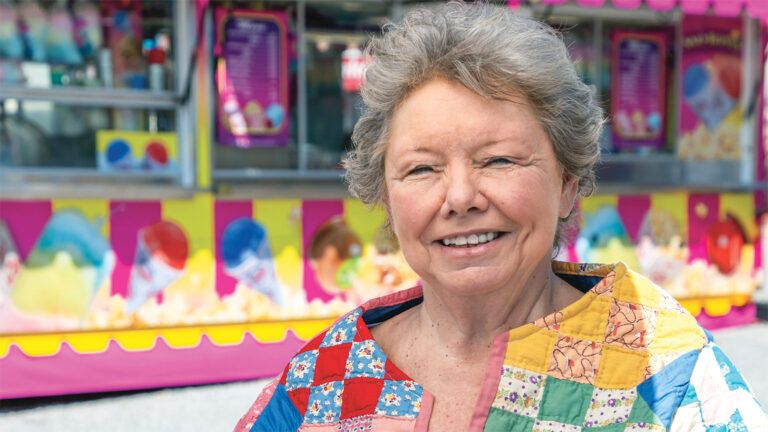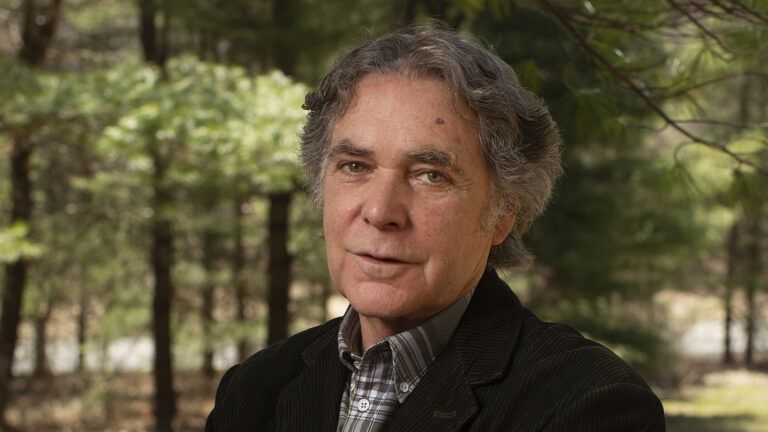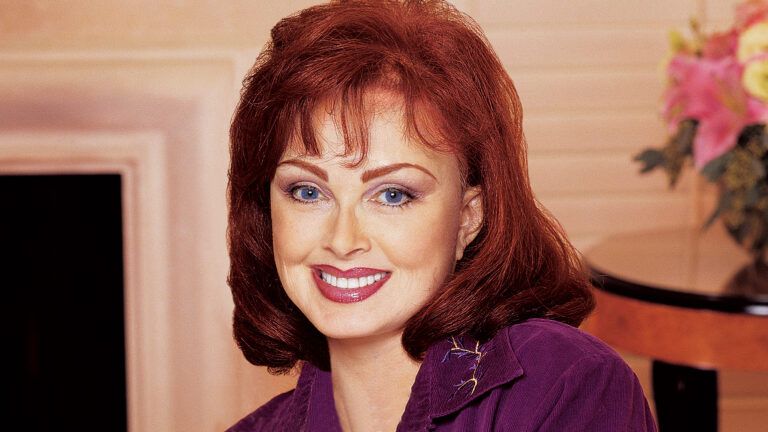“This is serious,” my doctor said, putting his hands on my shoulders and looking at me gravely. “The tests confirm what I’d suspected. You have diabetes. You are also overweight and out of shape. Pat, you’ve got to get control of your life—now!”
I sat there in shocked silence. He might just as well have handed me a death sentence. I had come to him with exhausting flu symptoms. My body ached. A persistent cough had hung on for weeks. But I was not prepared for his diagnosis. And worse, I was not prepared, perhaps not even able, to undertake his treatment program: a lifelong regimen of diet and exercise. I’d never been able to stick with a diet! And exercise? I could hardly walk!
Earlier I had been astonished when I stepped on the scale at the Salina Community Clinic while the nurse moved the weight along the bar as it passed 220, 230…and went up, up…until it came to rest at 255 pounds! I had no idea I’d become so heavy. And then the doctor told me my blood-sugar level was so high that, if unchecked, it could lead to stroke, blindness, kidney failure, circulatory problems, even loss of limb.
By the time I got home, I was thoroughly depressed. As I entered the door, I could smell the roast beef cooking in the oven. And I thought of the sour-cream raisin pie waiting in the refrigerator. What was I to do?
I dropped onto the sofa, wincing at the ache in my knees and ankles. I was only 45 years old but gimping around as though I were ancient. I stared at my reflection in a mirror from my purse. My Cherokee heritage had always been a source of pride to me, but now my black eyes and high cheekbones were sunk into puffy, soft skin.
I pulled out the menu plan Dr. Mobley had given me. Everything I loved to eat was either forbidden or allowed only in limited amounts. Notes on the menu explained how much fat lurked in butter, cheese and sour cream, and in red meat and canned goods such as soups and sauces. I read how the starches in bread and potatoes break down into sugar. And even the foods I was allowed were measured out in quantities that were a fraction of what I usually ate! In addition, Dr. Mobley had made it clear: This wasn’t a temporary diet meant for quick weight loss. I was supposed to eat like this for the rest of my life!
I knew the rest of my life might not be long, and it definitely would not be pleasant, if something didn’t change. But the truth was I couldn’t change. I wanted a piece of that sour-cream raisin pie! I headed for the kitchen—and ran right into my husband.
He could tell something was up. “So what did the doctor say?” he asked.
“He said”—and now I really was on the verge of tears—”no more pie.”
Jerry gathered our sons, Travis, 9, and Shawn, 19, and my parents, who lived nearby, to hear the news and rally to support me. “I need help and big hugs from everybody,” I said. But Travis’s face puckered as he tried to stretch his arms around me. “Gosh, Mom,” he said in frustration. “I’m doing the best I can but I’m just a little kid.”
“You can handle this, Patsy,” my mother announced with a forced brightness in her voice. She knew my weakness for food better than anyone.
My family did their best to help. They too cut down on fried foods. They went along with low-fat substitutes for butter, sour cream and cheese. They drank low-fat milk and tried not to eat their desserts and other high-calorie foods in front of me. Bless their hearts, they agreed to keep empty-calorie snacks and soft drinks out of the house. Raw vegetables were always cut and ready in the refrigerator. My mother came over and kept popping popcorn, adding no butter or salt, so that I’d have something to eat when I was desperate.
The rest of the family was encouraging too. I watched in amazement as Jerry called me into the living room and with a great “Ta-da!” whipped a blanket off an exercise bicycle. “Thanks, Jerry,” I said, giving him a hug while I glared over his shoulder at the bike. I felt exhausted just sitting on the porch swing; the thought of getting on that thing and pedaling made me want to cry.
There was a lot of sighing and moaning the next afternoon as I tried to get on that bicycle. Every muscle in my body ached as I started to pedal slowly. Within minutes my breathing was labored. I felt light-headed and leaned my quivering arms against the handlebars to rest. I tried again, but gasping for breath, I climbed down and stumbled to the sofa.
I’d never felt so awful. And the thing that used to make me feel better was now forbidden.
I recalled the doctor’s warning: Diabetes is a leading cause of death by disease in this country; 23.6 million people in the United States are diabetic, and fully half of them don’t know it. And for some unknown reason, Native Americans have the highest rate of diabetes of any ethnic group in the world. My own grandmother had been a victim; both her legs had been amputated because of diabetes.
I climbed on the bike again and started to pedal in a frenzy, but within seconds I stopped again. The number of pounds I needed to lose seemed so enormous, the effort I had to expend seemed so great. I retreated to the sofa again and covered my face with my hands. “God,” I prayed, “I’m grateful that I have a chance my grandmother didn’t, that because of what we know today about diet and exercise, I can save my life. But changing my unhealthy habits seems impossible. Please help me.”
I don’t know how long I sat there. I only know that as I calmed down, words drifted into my mind, words that repeated themselves again and again, giving me hope: It’s simple. It’s simple…
Simple? How could losing over 100 pounds be simple? How could jogging down the road be simple when I could barely get from room to room?
And then came a pattern of words, drumming in my head: Nobody can do it all at once. Just take it pound by pound, minute by minute, step by step. And know I am with you, step by step.
After a few minutes, I got up from the sofa and back on the bike, and I started to pedal again. I decided I’d ask God for strength to keep pedaling for this five minutes, and then to stick to my diet for this next meal to lose this next pound.
That night as I cooked steak for Jerry and the boys, I wanted to cut a chunk off for myself. I’m not exaggerating when I say the aroma of beef cooking was like a love song to me. But then I said a quick prayer: “God give me strength—for this moment.” Then I got my fish off the grill, squeezed on some lemon and added a plop of low-fat yogurt with dill. As the others ate their meal, I savored mine, slowly, thanking God for each bite. Hmmmm, this doesn’t taste so bad after all.
By the end of the next month, I stood anxiously on the scale while Dr. Mobley’s nurse moved the weight past the 220 mark and up . . . up . . . to rest at 242!
“You’ve lost 13 pounds,” the nurse exclaimed. “Good for you!”
When the weather warmed up, I started swimming in the creek. I had to ask God for an extra dose of strength to stay in that cold water after my first plunge, but then I realized that the cold water kept me moving. And when I got out I felt so great that I took a walk after dinner that night. As I headed down the street, breathing in the crisp evening air and watching the first evening stars come out, I realized something that brought a big grin to my face: My legs weren’t aching at all.
Dr. Mobley smiled as he read the results of my latest tests. “Your blood sugar is much lower,” he said. “If you keep this up, there’s no reason you can’t live a healthy, happy life.”
A healthy life. A happy life. They did go together, didn’t they?
Best of all was the moment months later when Travis threw his arms around my waist—and was able to reach around me. “You did it!” he cried in delight, letting go only to give me a round of spontaneous applause.
Well, maybe I did it, but I didn’t do it alone. I’m a living example of what happens when you take the advice I now give to everyone: When faced with an impossible task, ask for God’s help and just keep going. Step by step by step. For the rest of your life.





